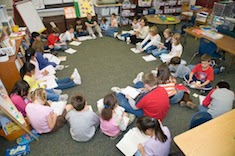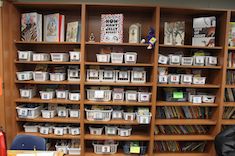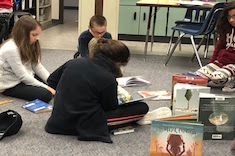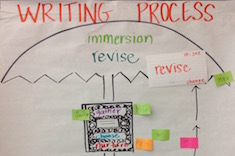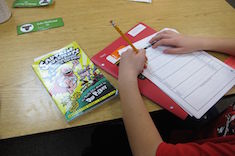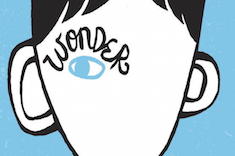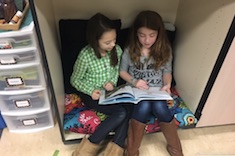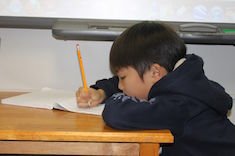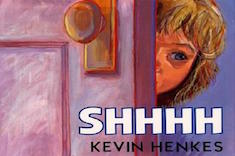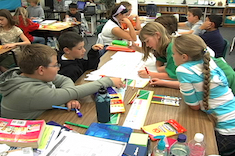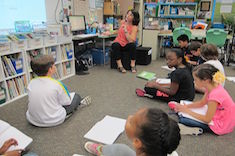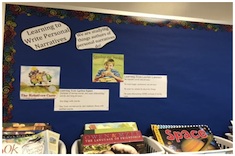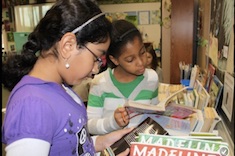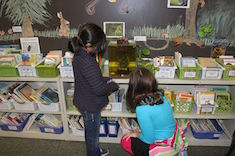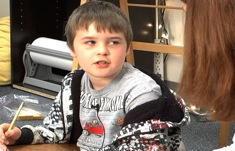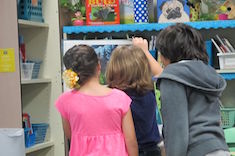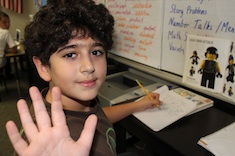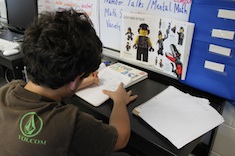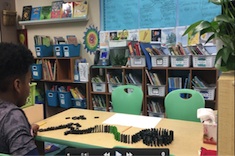3rd
Latest Content
Annotating While Reading
Franki Sibberson finds teaching students to annotate while reading is one of the best ways to promote ongoing reflective response in her fifth-grade classroom. She shares how she starts teaching annotation skills early in the year.
Keeping the Classroom Library Current
Franki Sibberson explains how she watches students closely and adjusts her library based on what she sees all year long.
Invitations vs. Accountability
It’s not an invitation if students are required to accept it. Franki Sibberson explains how engagement depends upon true choice and lots of options in her fifth-grade classroom.
Independent Project Hiccups
Tara Barnett and Kate Mills conclude their series on independent projects with advice on how to handle issues that often crop up as students design and work through writing their projects.
Reimagining Reading Logs
Reading logs have fallen out of favor in many classrooms because they often become a rote activity for recording pages read. Tara Barnett and Kate Mills find authenticity with the logs comes when they move from emphasizing recording to goals and reflection.
A Community Reads “Wonder”
Katherine Sokolowski had a dream — her whole community reading and celebrating the same book. She explains how she helped coordinate, organize, and purchase hundreds of books for a community-wide reading of Wonder.
One Text, Many Lessons
Tara Barnett and Kate Mills share how one book can serve as an anchor for lessons on everything from writer’s craft to test-taking skills.
Fostering More Rereading in Classrooms
Stella Villalba explains why rereading is especially useful for young English language learners, and shares some simple strategies for integrating more rereading strategies into reading and writing workshops
Flexible Seating: Mid-Year Tweaks with Book Nooks
Have you revisited your classroom design since September? Andrea Smith and her fourth graders get over the midwinter blahs by refreshing classroom seating together.
Writing Empathy
Dana Murphy explains why teachers can have true empathy with student writers only if they write themselves, and chronicles the difference between a typical and an empathetic response in a writing conference.
Using Read Alouds to Build Fluency
Tara Barnett and Kate Mills find an ingenious way in the upper elementary grades to help their struggling readers develop fluency through read alouds.
Color-Symbol-Image: A Thinking Routine for Read Alouds
Andrea Smith uses the Color-Symbol-Image thinking routine during read alouds to promote deeper reflection among students.
Gradual Release of Responsibility in Small Groups
Tara Barnett and Kate Mills develop a process of pre-assessment, careful planning, and systematic recordkeeping to up the value of their small groups.
Building a Reflective Community
Andrea Smith builds reflection into whole-class discussions in her fourth-grade classroom by beginning an anchor chart with four different illustrations from the covers of a read-aloud.
Sentence Phrase Word: Student Independence for Word Learning
Andrea Smith uses the sentence-phrase-word thinking routine with her fourth graders to show how potent one word can be in understanding complex themes.
Sharing and Celebrating Summer Reading
Tara Barnett and Kate Mills share how they use the first days and weeks of school to celebrate summer reading and build a classroom community.
Planning for a Narrative Writing Unit of Study
Franki Sibberson believes planning a unit of study should be just as much fun as planning a trip to Disney World. She explains her planning process for one of her first units of study, on narrative writing.
Reconsidering Reading Workshop Routines
Andrea Smith realizes her normal reading routine will not work within the constraints of this year’s schedule. She makes some radical changes to ensure she and her students can have enough time to find the joy in reading and building a literate community.
Sketchnoting as a Response to Reading
Dana Murphy tries sketchnoting during professional development, and soon finds herself sharing the fun technique with students. They hone their skills during read alouds and while annotating texts.
The Benefits of #bookaday
Franki Sibberson finds the investment of five to seven minutes a day for #bookaday with her third graders is truly time well spent.
Supporting Student Agency with Questioning Strategies
Katrina Simkins-Moore explains why becoming more intentional in questioning during reading conferences can help build student independence, as well as consistency among the teaching community.
Free-Range Learning with Nonfiction Part 2: Infographics and Maps
Andrea Smith shares the final installment of her series on the value of free-range learning in helping students explore nonfiction.
Free Range Learning with Nonfiction (Part 1)
Andrea Smith's students explore nonfiction through free-range roaming. She explains how she sets up expectations and resources early in the year in this first installment of a two-part series.
The Craft of Blogging
Franki Sibberson uses a micro-progression of her own draft of a blog post to help her third graders improve their blogging skills.
Bad Days in Workshops
Franki Sibberson realizes there are some bad days in literacy workshops that hold no great life lessons for teachers and students, and that is okay.
Bridging the Gap Between Intervention and the Classroom
Kate Mills and Tara Barnett share strategies for building bridges between intervention and classroom instruction.
Embracing the Books My Students Love
Franki Sibberson explains why we need to move beyond our cherished definitions of quality when working with third graders in transition and embrace the books students love.
Mentors for Process and Habits
Ruth Ayres shares some of her favorite mentors and mentor texts for developing good writing processes and habits.
Mentor Texts for Crafting Nonfiction
Melanie Meehan talks with a third-grade teacher about how she helps students focus on craft elements in nonfiction mentor texts.
Introducing the Classroom Library
Andrea Smith shares a sequence of lessons she uses to introduce the classroom library to her fourth-grade students.
Browse Content By
Type
Category
- Assessment Tools
- Big Fresh Archives
- Booklists
- Choice Numeracy
- Classroom Design
- Common Core
- Community Building
- Conferring
- Content Literacy
- Digital Literacy
- English Language Learners
- Equity
- Family Relations
- Free Samples
- Guiding Groups
- Leadership
- Literacy Coaches
- Mentor Texts
- Minilessons
- New Teacher Mentors
- Podcasts
- Poetry
- Quote Collections
- Reading Strategies
- Self Care
- Struggling and Striving Learners
- Talking and Listening
- Teacher Study Groups
- Teaching Reading
- Teaching Writing
- Word Study and Vocabulary
Author
- Melissa Quimby
- Nawal Qarooni
- Gwen Blumberg
- Julie Cox
- The Lead Learners
- Hannah Tills
- Josie Stewart
- Ruth Metcalfe
- Mallory Messenger
- Becca Burk
- Jodie Bailey
- Vivian Chen
- Mary Brower
- Tiffany Abbott Fuller
- Stephanie Affinito
- Ruth Ayres
- Leigh Anne Eck
- Heather Fisher
- Shari Frost
- Julie Johnson
- Suzy Kaback
- Gigi McAllister
- Shirl McPhillips
- Melanie Meehan
- Cathy Mere
- Debbie Miller
- Tara Barnett and Kate Mills
- Tammy Mulligan
- Dana Murphy
- Bitsy Parks
- David Pittman
- Brenda Power
- Heather Rader
- Matt Renwick
- Mandy Robek
- Christy Rush-Levine
- Gretchen Schroeder
- Jen Schwanke
- Brian Sepe
- Katherine Sokolowski
- Stella Villalba
- Jennifer Vincent
Grade Level
Choice Literacy Membership
Articles
Get full access to all Choice Literacy article content
Videos
Get full access to all Choice Literacy video content
Courses
Access Choice Literacy course curriculum and training

